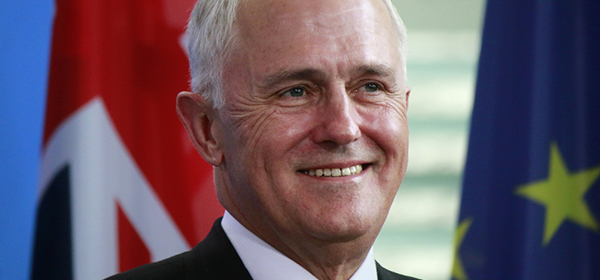For the second time since ousting Tony Abbott to become Prime Minister, Malcolm Turnbull has unveiled a new cabinet line-up. With this new-look front bench due largely to the resignation of Mal Brough, Warren Truss and Andrew Robb, Mr Turnbull has taken the opportunity to promote more women to the Cabinet and the executive.
National MP Darren Chester has been offered the Infrastructure and Transport portfolio previously held by Nationals Leader Warren Truss. Barnaby Joyce, who will also become Deputy Prime Minister, and will keep his portfolio of Water and Agriculture, will replace Mr Truss as Nationals Leader. Assistant Health Minister Fiona Nash, who has been elected as Deputy Leader of the Nationals, will move to the Cabinet as Regional Development Minister and Minister for Regional Communications. She will also retain her position as Minister for Rural Health
Boosting the Number of women in the Cabinet to six, Senator Concetta Fierravanti-Wells will become Minister for International Development, with Craig Laundy taking on her old role as Assistant Minister for Multicultural Affairs. Meanwhile, a recommendation from the outgoing Trade and Investment Minister Andrew Robb, who will continue as Special Envoy for Trade, will see Steve Ciobo take on the role.
Finance Minister Matthias Cormann will add Special Minister of State to his role following the resignation of Mal Brough. Although denying any wrongdoing in he Peter Slipper Affair, Mr Brough asked the Prime Minster to fill his role, which he had temporarily stepped down from several weeks ago.
Following his resignation, after being found to have abused his ministerial position on a personal business trip to China, Stuart Robert’s portfolio will be split. Alan Trudge will take the role of Minister for Human Services and Dan Tehan will become Minister for Defence Material and Minister for Veterans Affairs.
On announcing the new Cabinet and executive, which will be sworn in on Thursday, Malcolm Turnbull said it will be “a dynamic team which combines youth, new talent, experience, continuity, and a real sense of innovation and enterprise”.
“It’s a team that’s focused on Australia’s future, focused on the policies that will encourage innovation and enterprise,” he said.
After failing to feature in the National Party’s ministerial line-up, Luke Hartsuyker will be replaced by Senator Scott Ryan, as Minister for Vocational Education and Skills. And the appointment of Queenslander Matt Canavan as Minister for Northern Australia completes the major changes.
Read more at ABC.net.au
Opinion: Poll drop to end early election chat
With a federal election rumoured to be in the pipeline for August or September, Malcolm Turnbull will be hoping his ‘young, dynamic and talented’ ministry gives him a popularity boost, after the latest Fairfax-Ipsos Poll shows a downturn in our passion for the Prime Minister.
The initial euphoria, felt by voters after the removal of Tony Abbott as Prime Minster, has given way to scepticism and fear of GST hikes if the latest poll is to be believed. The latest ministerial scandals have seen Mr Turnbull’s Coalition Government slip to a level of popularity lower than that of Mr Abbott’s before the 2013 Federal Election.
Although the Government is still ahead in the two-party preferred vote, a drop of four points sees it now sit at 52-48 and is likely to end all talk of an early election, with just 22 per cent of those polled backing such a move by the Prime Minister.
However, while the Coalition has slipped four percentage points in both its first preference and two-party preferred support, Labor has seen a jump in popularity by three and four points respectively.
Malcolm Turnbull’s personal approval rating, the number of people pleased by his performance minus those displeased, has also dipped 15 points since November, currently sitting at 38. Mr Turnbull can take heart that he is still a more popular choice as Prime Minster than Bill Shorten, but even this support has slipped by five percentage points to 64, with Mr Shorten languishing on 19.
The Greens could be the big winners in Mr Shorten’s apparent unpopularity, with support for the party rising to 15 per cent.
The poll of 1403 respondents was taken over 11–13 February, before the Cabinet reshuffle and after the resignation of Human Services Minister Stuart Robert.
Will the Cabinet reshuffle and the clear out of rogue ministers help Mr Turnbull draw a line under the turbulent last six weeks and move forward to the federal election? Or is there still a fear of what may be unveiled at the budget in May? Does Bill Shorten’s apparent unpopularity make it impossible for Labor to mount a credible challenge the Coalition Government at any upcoming election? And if so, do you see a move to replace Mr Shorten as leader?

